What if your next lawyer was not human but smarter, faster, and always available?
The legal industry is entering a new era where AI Lawyer tools are reshaping how professionals research, draft, and analyze documents. According to Forbes, more than 44% of law firms already use AI legal solutions to improve productivity and reduce costs.
In this article, you will learn what an AI Lawyer is, how artificial intelligence for lawyers works, and why it is transforming the future of law practice.
What Is an AI Lawyer?
An AI Lawyer or lawyer AI is a system built with artificial intelligence tools to perform or assist in legal work such as contract drafting, document review, and legal research.
Unlike human lawyers, an AI lawyer can read thousands of pages in seconds, identify crucial information, and deliver data-driven insights with precision.
Key Capabilities of AI Lawyers
- Legal Research Automation: Finds relevant laws, precedents, and rulings quickly.
- Document Review: Detects risks, missing clauses, and inconsistencies.
- Contract Drafting: Generates professional legal documents automatically.
- Case Prediction: Analyzes similar cases to estimate possible outcomes.
- Compliance Monitoring: Tracks and updates new legal regulations.
How AI Is Changing the Legal Landscape
Artificial intelligence is not replacing lawyers. Instead, it is helping them work smarter and faster while maintaining accuracy. Below are key areas where AI for lawyers is making a significant difference.
1. Faster Legal Research
AI systems can process vast legal databases in seconds.
Tools like Casetext CoCounsel and Harvey AI provide case summaries and citations almost instantly, reducing research time dramatically.
2. Smarter Document Review
Manual document review often takes days or weeks. AI can complete the same work in hours by detecting errors and missing clauses through advanced text analysis.
3. Contract Lifecycle Management
AI automates every step of contract creation, from drafting to negotiation and signing.
Law firms using AI legal tools report up to 50% faster contract turnaround times.
4. Cost and Time Efficiency
By handling repetitive work, AI helps lawyers focus on strategy, client relationships, and complex litigation. This results in lower costs and higher satisfaction for clients.
Top Benefits of Using AI for Lawyers
| Benefit | Description | Impact |
|---|---|---|
| Speed | Completes research and reviews in minutes. | Saves 50–70% of work time. |
| Accuracy | Detects human errors in documents. | Reduces legal risk. |
| Scalability | Manages multiple clients at once. | Boosts productivity. |
| Data-Driven Insight | Predicts outcomes based on data. | Improves decision-making. |
| 24/7 Availability | Works continuously without breaks. | Enhances client support. |
8 Popular AI Lawyer Platforms and Tools
1. AI Lawyer Pro (General Legal AI)
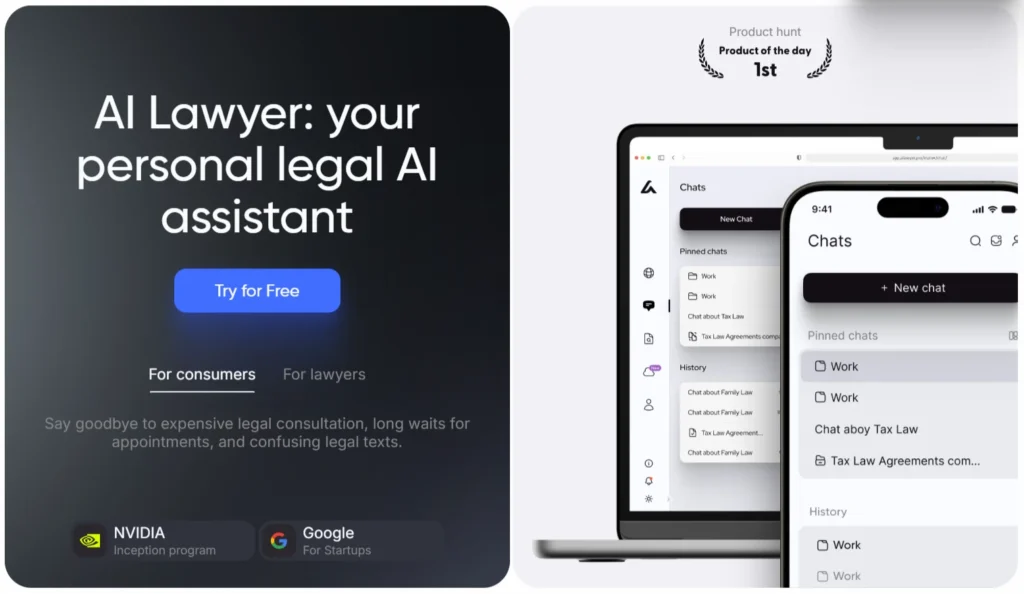
- Primary Function: General AI assistant tailored for legal tasks, focusing on drafting and summarization.
- AI Advantage: While information about specific features may vary as it is a newer or less widely known tool compared to major platforms, tools with “Pro” in the name typically aim to provide a comprehensive workspace for legal professionals. This often includes features like document summarization, initial legal memo drafting, and answering basic legal questions by accessing integrated legal data or large language models (LLMs).
- Target Users: Solo practitioners and small firms looking for affordable, all-in-one AI support.
2. Harvey AI

- Primary Function: Powerful generative AI platform for complex legal analysis, research, and high-quality legal drafting.
- AI Advantage: Harvey is built on proprietary LLMs and is known for its high-level accuracy and ability to handle sophisticated legal tasks. It works closely with some of the world’s largest law firms to provide services like synthesizing complex legal arguments, analyzing internal firm data (if integrated), and delivering highly nuanced legal research insights. It often acts as a specialized, high-end “co-pilot” for lawyers.
- Target Users: Large law firms, corporate legal departments, and sophisticated legal teams handling complex transactions and litigation.
3. LexisNexis AI / Lexis+ AI
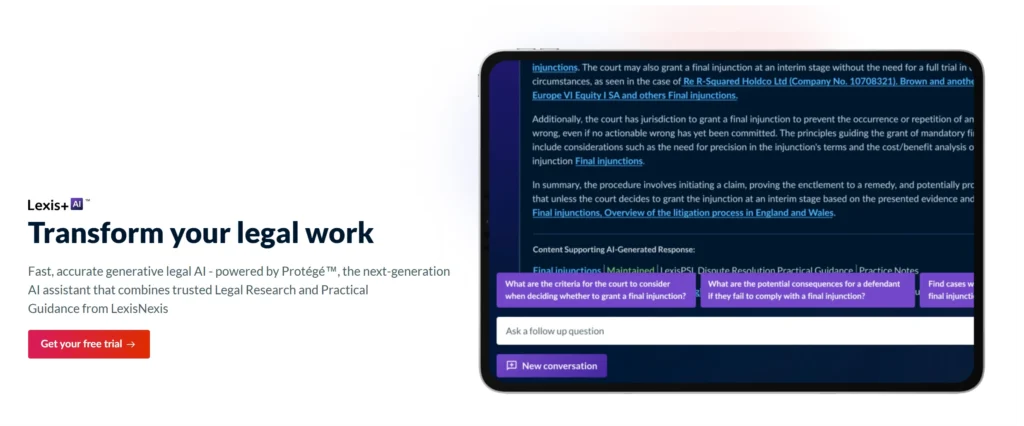
- Primary Function: Comprehensive legal research, citation validation, and case summarization.
- AI Advantage: LexisNexis leverages generative AI to allow lawyers to ask natural language research questions and receive validated answers complete with summaries and direct citations to relevant cases, statutes, or regulations. Its core strength lies in its vast, validated legal database and features like Shepard’s for checking if a case is still “good law.”
- Target Users: Large law firms, law schools, government agencies, and corporate legal departments globally.
4. Casetext CoCounsel
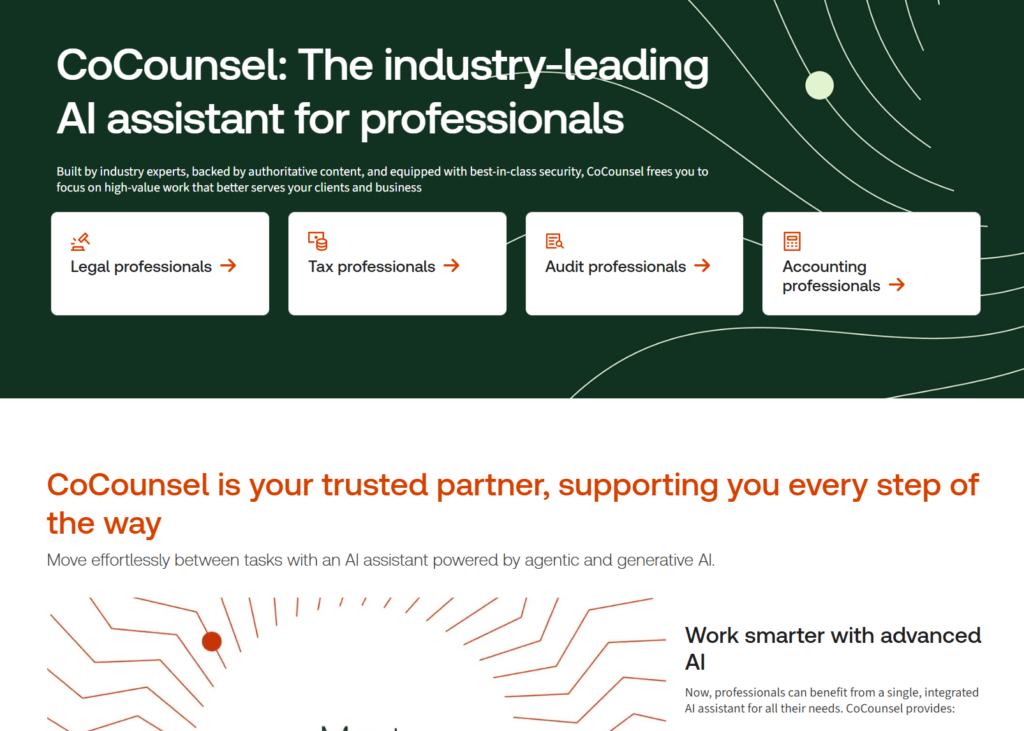
- Primary Function: Generative legal assistant for drafting, research, and contract analysis.
- AI Advantage: CoCounsel is a pioneer in integrating generative AI into daily legal workflows. It excels at time-consuming tasks such as summarizing lengthy case documents, drafting initial memos or arguments, and answering complex legal questions by identifying relevant case law quickly and accurately.
- Target Users: Litigators, transactional attorneys, and law firms of all sizes seeking efficiency gains in research and drafting.
5. Lex Machina
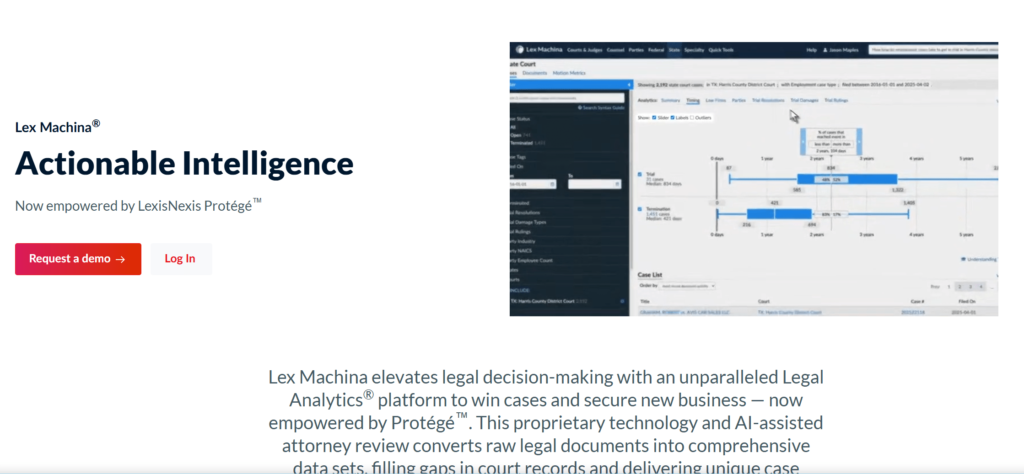
- Primary Function: Predictive litigation analytics and legal data analysis.
- AI Advantage: Lex Machina (part of LexisNexis) does not primarily search statutes; it analyzes detailed court data (litigation data) to provide actionable insights. It helps users:
- Evaluate the probability of success based on the history of specific judges, juries, or opposing counsel.
- Understand the typical duration and cost of particular case types.
- Analyze the strategies used by the opposing side in past litigation.
- Target Users: Litigators, risk managers, and attorneys focused on patent, IP, and business litigation.
6. vLex Vincent AI
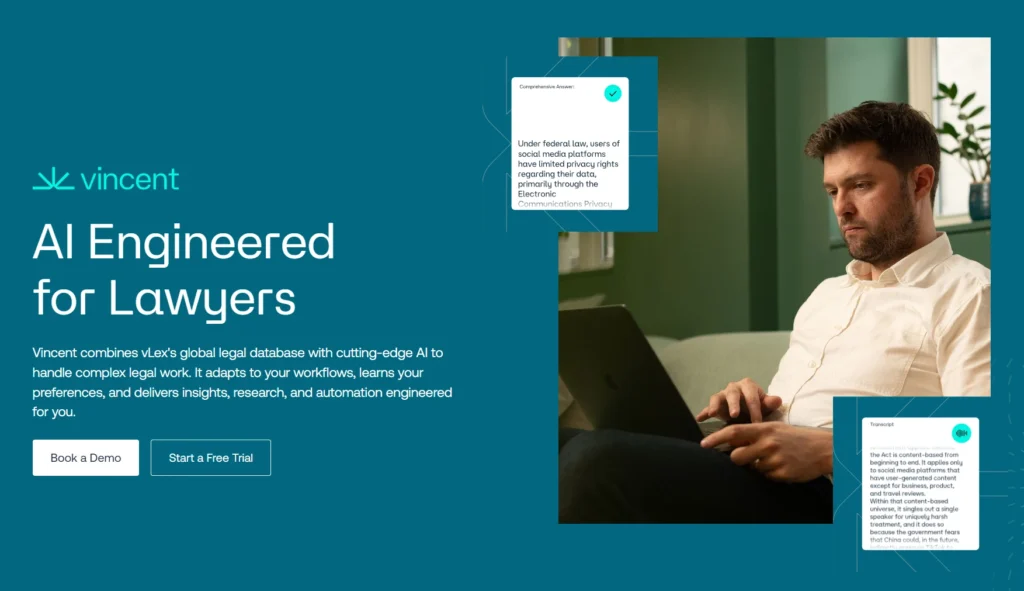
- Primary Function: Global legal research and drafting support with cross-jurisdictional access.
- AI Advantage: Vincent AI is notable for its vast global coverage, indexing laws and cases from over 100 countries. Its AI features allow users to upload their own legal documents and have the AI find the most contextually relevant case law or regulations from the vLex global database, making it ideal for comparative or international law.
- Target Users: Lawyers working on international or transnational legal matters, and academic researchers.
7. Legal Hero (Indonesia Focus)
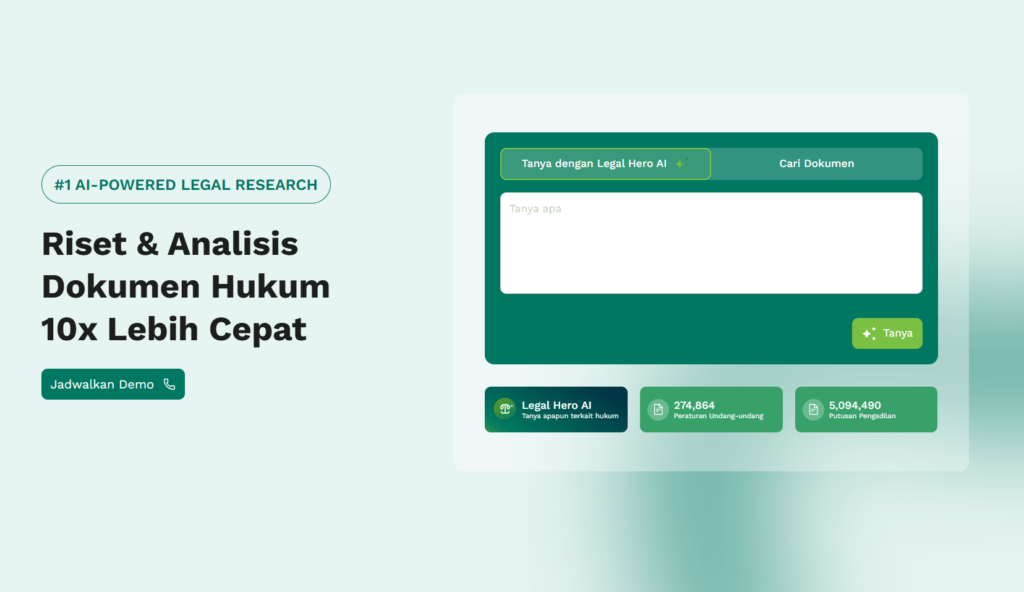
- Primary Function: AI-based legal research platform specifically for Indonesian law.
- AI Advantage: Legal Hero is custom-built for the Indonesian legal environment. It indexes and enables smart searching across millions of Indonesian court decisions, laws, and regulations. Its main advantage is the ability to understand the context of complex Indonesian legal queries and deliver highly relevant results from its local database.
- Target Users: Indonesian lawyers, notaries, academics, and law students in Indonesia.
8. Hukumonline AIlex (Indonesia Focus)
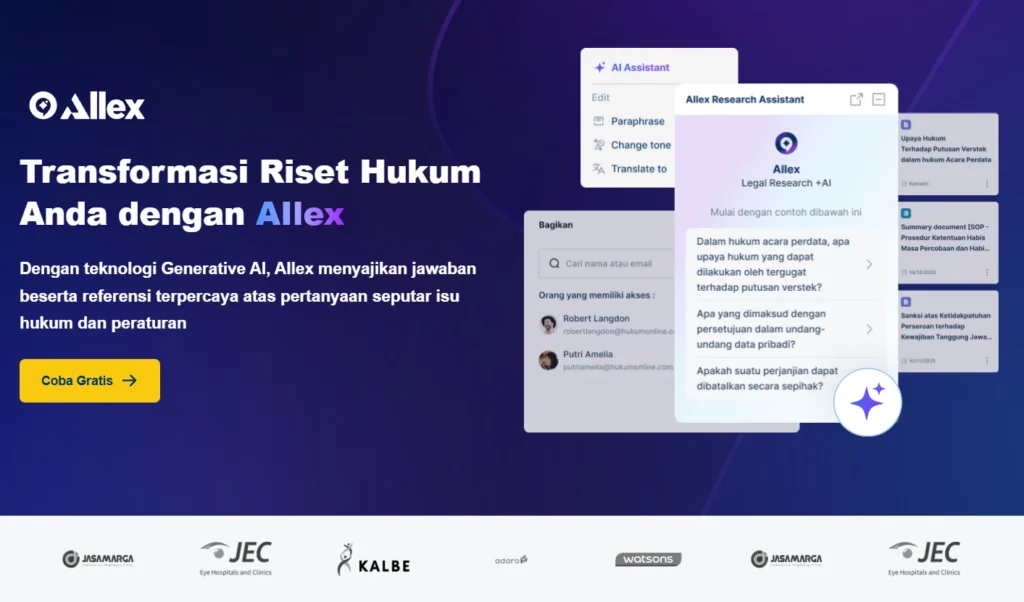
- Primary Function: Indonesian legal research platform with AI analysis features.
- AI Advantage: As a leading provider of Indonesian legal databases, Hukumonline integrated AIlex to enhance the research experience. The tool assists users in navigating the extensive database, summarizing lengthy regulations, and providing trend analysis found within Indonesian legal documents and jurisprudence.
- Target Users: Lawyers, legal consultants, and practitioners in Indonesia requiring credible access to a comprehensive regulatory and jurisprudential database.
| Tool Name | Primary Function | Key AI Advantage | Target Users | Jurisdiction Focus |
| LexisNexis AI / Lexis+ AI | Comprehensive Legal Research & Validation | Generative AI for validated, cited answers and “Good Law” checking. | Large Law Firms, Corporate Legal Depts. | Global (Primarily US/UK/Commonwealth) |
| Casetext CoCounsel | Generative Legal Assistant & Drafting | Automated drafting of memos, complex research summaries, and contract analysis. | Litigators, Transactional Attorneys | Primarily US |
| Lex Machina | Litigation Analytics & Prediction | Predicts case outcomes, analyzes judge/jury behavior, and provides litigation strategy insights. | Litigators, Risk Managers | Primarily US |
| vLex Vincent AI | Global Legal Research & Contextual Search | Upload documents to find contextually relevant law from a vast, 100+ country database. | International/Transnational Lawyers, Academics | Global |
| Harvey AI | High-End Generative AI & Analysis | Sophisticated LLM for complex legal arguments, research, and analysis of internal firm data. | Large Law Firms, High-Volume Corporate Legal | Global |
| AI Lawyer Pro | General Legal Assistant & Drafting | Provides a broad workspace for drafting, summarizing, and basic legal Q&A. | Solo/Small Law Firms | Varies/General |
| Legal Hero | Indonesian Legal Research Platform | Smart searching and contextual relevance within a massive database of Indonesian statutes and court decisions. | Indonesian Lawyers, Academics | Indonesia |
| Hukumonline AIlex | Indonesian Legal Database & Analysis | AI features for navigating extensive Indonesian regulations, summarization, and trend analysis. | Indonesian Lawyers, Legal Consultants | Indonesia |
How AI Improves Client Relationships
1. Faster Response Times
Clients receive answers in real time through AI-powered chat interfaces, improving satisfaction and trust.
2. Transparency and Accessibility
AI makes legal knowledge more accessible to non-lawyers by simplifying legal jargon into understandable language.
3. Affordable Legal Support
By reducing manual labor, law firms can offer more affordable services to a broader range of clients.
Challenges and Ethical Considerations
While AI lawyers provide speed and efficiency, they also raise important questions about ethics, bias, and accountability.
1. Data Privacy
AI systems rely on sensitive data. Law firms must ensure encryption, compliance with GDPR, and strict confidentiality policies.
2. Accuracy and Oversight
AI models can occasionally misinterpret complex legal nuances. Human supervision remains essential.
3. Regulatory Uncertainty
Many jurisdictions are still defining how AI can be used in legal practice, especially in areas involving court filings or litigation.
The Future of AI in Law
According to a 2024 Statista report, the global legal AI market is projected to exceed $3.2 billion by 2028.
The trend indicates that AI will become a standard part of every modern law firm’s toolkit.
Future AI systems will not just assist lawyers but collaborate with them in real-time, offering context-aware insights and predictive analytics to guide legal decisions.
Conclusion
The rise of the AI Lawyer represents one of the most exciting transformations in modern law.
By combining human expertise with machine intelligence, law firms can work smarter, faster, and with greater precision.
Whether you are a solo practitioner, a law student, or part of a large firm, embracing AI for law is no longer optional. It is the next step toward a more efficient and client-centered legal industry.
Ready to explore the future of legal technology? Visit AI Lawyer Pro and experience what the next generation of legal innovation looks like.
FAQ: Frequently Asked Questions
What is an AI Lawyer?
An AI Lawyer is an artificial intelligence system designed to perform legal tasks such as drafting contracts, conducting research, and analyzing cases.
Can AI replace human lawyers?
No. AI assists lawyers by automating repetitive tasks, allowing them to focus on strategy, argumentation, and client interaction.
Is AI legal technology safe to use?
Yes, as long as firms follow strict data protection laws and choose platforms with strong privacy policies.
Which AI tools are best for lawyers?
Popular options include AI Lawyer Pro, Harvey AI, Casetext CoCounsel, and DoNotPay.
How does AI affect law students?
AI tools help law students conduct research faster, prepare case briefs, and understand legal reasoning more effectively.

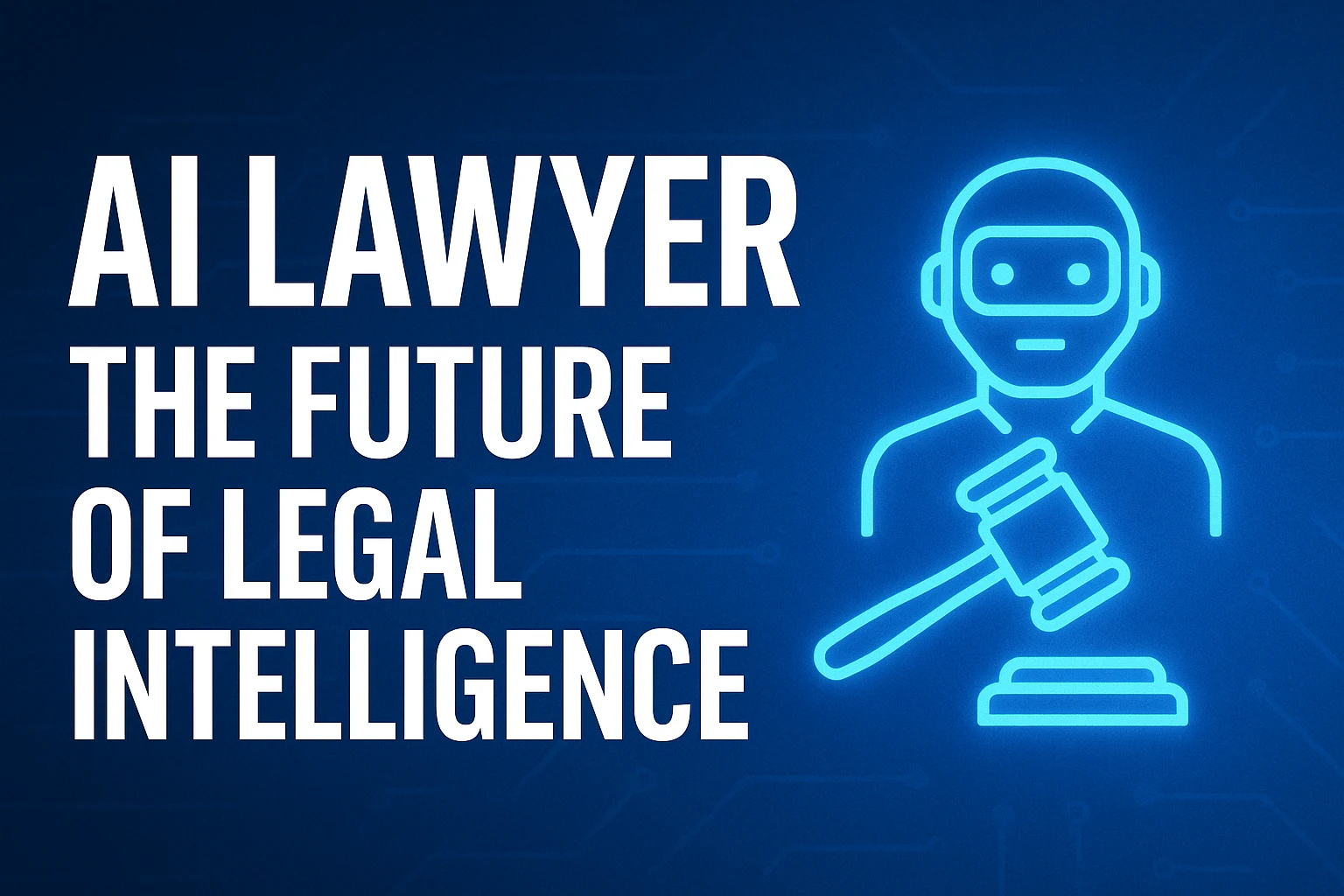








Leave a Comment